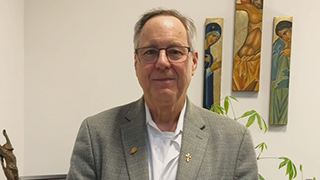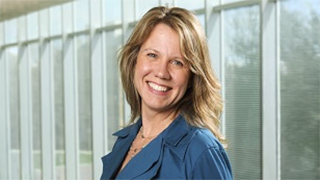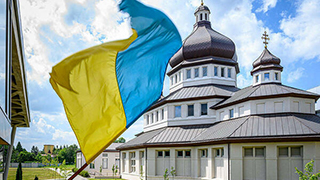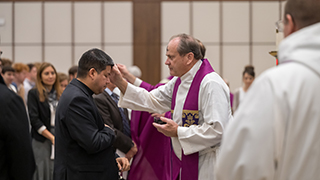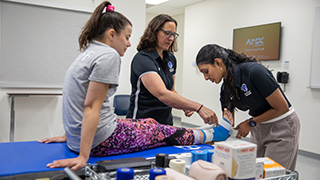Energized by International Dialogue: Professor Murzaku Shares Experience in Vienna
Tuesday, November 28, 2023
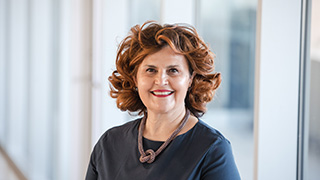 Having participated in a prestigious conference in Vienna, Austria, sponsored by the
Pro Oriente Foundation, a Seton Hall professor has returned with even more confidence
in the ability of interreligious and interethnic dialogue to foster peace and justice.
Having participated in a prestigious conference in Vienna, Austria, sponsored by the
Pro Oriente Foundation, a Seton Hall professor has returned with even more confidence
in the ability of interreligious and interethnic dialogue to foster peace and justice.
Ines A. Murzaku, Ph.D., Professor within the Department of Religion and Director of the Catholic Studies Program, accepted the invitation to participate in this international meeting, which took place in early November. The theme of the conference, "Healing of Wounded Memories," fostered conversations among leaders in research and dialogue who focus on world regions embroiled in conflict. The panels and breakout discussions focused on collective trauma and victimization, collective metanoia, transitional justice, theological discourse and practices in regions facing conflict, and healing Orthodox-Catholic relations. Murzaku’s research and practice have focused on many of these themes.
The Pro Oriente Foundation was established in 1964 during the Second Vatican Council. Its mission is "fostering communion between the Eastern and Western churches." Through opening and sustaining dialogue, Pro Oriente promotes "the common good" and the building of "a more humane society."
Amid current global conflicts, the Pro Oriente conference in Vienna opened a space for dialogue to work toward peaceful resolution of some of the world’s most pressing challenges. Pro Oriente President Alfons M. Kloss explained that the conference allowed for "strengthening those forces in church and society who work for reconciliation in their countries." He noted that the conference "consider[ed], among other things, the Middle East conflict and the Ukraine war."
Murzaku’s presentation at the conference was titled "Forgiveness Redefined: Exploring an Innovative Theological Paradigm Through the Lens of Mother Teresa and Albania's Ongoing Transitional Justice." Murzaku shared a reflection on Mother Teresa’s Albanian heritage, the suffering she and others faced during the Communist regime in Albania, and her modeling of forgiveness for the wrongs she and her family endured. This topic draws on research Murzaku is conducting for two current projects: her second book on Mother Teresa, focusing on the saint’s revolutions of tenderness, politics, and society (Routledge, 2024); and an upcoming issue of the journal Religions Murzaku is co-editing, which will focus on transitional justice in the provision of human rights in post-communist countries.
"It’s especially exciting to see convergence in my areas of research and practice," said Murzaku. "I’m very grateful that this conference allowed me to forge and strengthen relationships with scholars and practitioners engaged in peacebuilding, and I hope to continue discussions with them. Most importantly, I look forward to inviting my students into the dialogue, as today’s students are our best hope for a peace-filled future."
Murzaku has become increasingly involved in international initiatives promoting peace through fruitful dialogue. Earlier this year, she joined the Inter-Religious Dialogue and Peace-Building Research Group of the Institute of European Studies and Human Rights at the Pontifical University of Salamanca in Spain, and she subsequently accepted the invitation to join the International Women’s Network, a new initiative of the Vatican Dicastery for Interreligious Dialogue.
Murzaku finds that the conversations in which she is privileged to engage bolster her research. "Much of my current research is on the revolutionary philosophy and actions of Mother Teresa," explained Murzaku, "and by engaging in dialogue with those seeking peace across the globe, I see ever more clearly how her emphases on tenderness and justice, animated by faith, can truly change the world."
Categories: Arts and Culture, Faith and Service, Research


